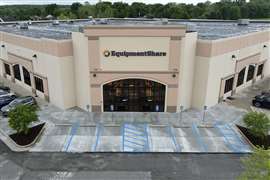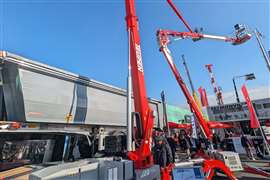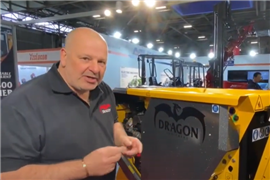GAM widens outlook as slowdown bites at home
21 November 2008

Carlos Fernández Araoz, general manager of Spain's biggest rental company GAM, refuses to allow talk of recession to dampen his enthusiasm for the rental business. In the course of an hour-long conversation, Mr Araoz - a former management consultant who took up his post last December as number two to CEO Pedro Luis Fernández - argues that GAM has so far been able to withstand the worst of the downturn by virtue of its historical strengths and because it foresaw what was coming.
"We've been lucky", he says, "We've always been very focused on civil works and infrastructure - that has a lot to do with our origins - in the northern part of Spain, not the touristic, ‘second-home' parts of the country [where the downturn is most pronounced].
"At the same time, the North was always badly connected to the middle and the South of the country - there have been big investments in infrastructure. We have very deep DNA in civil works, which accounts for two thirds of our construction revenues. That has helped us deal with the downturn in two ways: we are present in long term sites and have good relationships with major contractors.
"That activity has declined slightly less. The core of our business is stable and growing and we have very little residential work [just 6% of turnover in the first half of 2008, according to GAM's accounts]. In contrast, our competitors are not only suffering a decline in residential work, but they are striving to finds a position in civil works."
Much of this type of work is government funded, and even it is not immune from recession. Spanish state investment in infrastructure projects fell by 16% in the first half of this year; "That is the only concerning number", says Mr Araoz, who joined GAM in May 2006 as a non-executive director, "I would like to see the government [pushing] infrastructure in a far greater manner than I'm seeing."
However, Mr Araoz is keener to talk about the other measures that GAM has taken to prepare for the current market; "18 months ago we decided to be a real Generalist, in capital letters, and expanded into new areas. Now, non-construction is a third of our revenues and is growing very aggressively. Easily 50% of our recent growth has been non-construction. Capital expenditure has been very strong in that area."
GAM's revenues of €187.8 million for the first six months of 2008 were 48% higher than the same period in 2007. (EBITDA (earnings before tax, depreciation, amortization) was up 51% to €80.8 million.) Take into account the new acquisitions (Vilatel and Viasolo) and that revenue increase falls, but is still 19% on a proforma basis. A third of that turnover is generated by activity in industry, energy, wind farms, railways, ports and tool hire.
"We are seeing fabulous growth in railways, in windmills, in the green side of the business [such as gardening and street cleaning equipment] and in harbours. That was a 100% ‘ownership' market where we are now growing very fast", says Mr Araoz.
The other headline-grabbing part of the diversification strategy has been expansion outside of Spain. The company is already a dominant player in Portugal, but in the last two years it has opened locations in Bulgaria, Poland and Romania, and in September established its first rental outpost in Latin America, with a depot in Mexico City. Another will follow in Sao Paolo, Brazil before the end of 2008.
Mr Araoz says GAM has looked at 25 potential markets and selected countries based on three main factors: economic growth and infrastructure plans; areas without large existing rental players; and countries where major Spanish contractors are working.
Bulgaria, Romania, Poland, Mexico and Brazil met all these criteria. Some obvious candidates are not on the agenda, including Russia, where Mr Araoz cites a business culture that he says would not fit with GAM's ethics.
He describes Romania as a "fabulous market", thinks Poland is a great long term prospect, but is less enamoured of Bulgaria.
"Mexico is very interesting. Rental is hardly developed and the country is quite chaotic, but there is a massive infrastructure plan", he says, "There is going to be a pick-up in construction but equipment financing is undeveloped - contractors want to be able to pick up all the machines that they need."
Five new markets will already stretch the company's management capacity, so don't expect many additional new markets soon, even though Mr Araoz "dreams" of one day renting in India or moving up to Texas from the Mexican operation. He also talks of Turkey and India as longer term prospects.
The strategy in the international markets is to move equipment from the Spanish operation and to use GAM's own staff. In the case of Mexico, it shipped 100 units directly from Spain to Mexico and had pre-arranged contracts with Spanish customers working in the country.
The overseas operations, including Portugal, still account for less than 5% of total turnover, but is growing fast, at around 43% in the first half of this year. International revenues will be around €20 million in 2008; "If I triple it, it's already significant", says Mr Araoz, "That would take us to 2010".
Although moving into these new markets is stimulating to discuss, he makes the point that "we don't need to go everywhere" and says GAM still has enormous opportunities in its home market.
He forecasts the Spanish slowdown will mean very tough general economic conditions for the next 18 to 24 months; "which is going to be a big opportunity for us to grow." He claims GAM's market share has risen by 3-5% in the last 18 months, now reaching 15-20%, and says it will increase.
"We are not situated equally in all geographical regions of Spain. Last year, in Catalonia, we did €12 million. This year we will reach €30 million", he says. The company's share of the Valencia market, for example, is also relatively low.
He says GAM is renting to no more than 40% of construction sites in Spain; "It think there is just a lot of the market that we have never visited...we must go to more sites, more often, and earlier than everybody else." In the past, he says, GAM's target projects were €50 million or bigger, and he thinks that there is a real opportunity to focus on project in the €5-20 million budget.
The aerial platform sector - a very competitive one in Spain - is one area where GAM thinks it can perform better. Now having integrated last's year's Vilatel acquisition and with a major aerial platform fleet, Mr Araoz believes there is scope for the division to be more aggressive.
"Aerials is probably the part of the business that has not grown so much. The companies we bought were not very aggressive commercially. We are pushing them to go beyond the market definition they used to think about. The aerials industry is full of ‘specialists'. They don't like some parts of the business, but other parts they do like. I'm saying as long as there is someone with a cheque then that's enough. We are changing the culture."
That will be just one of the challenges facing the company over the coming 24 months. The past five years has seen GAM make enormous progress ("From village company to multi-national" is how Mr Araoz puts it), but the next phase will determine its long term future. Surviving recession at home and prospering abroad will be among its primary measures of success.






